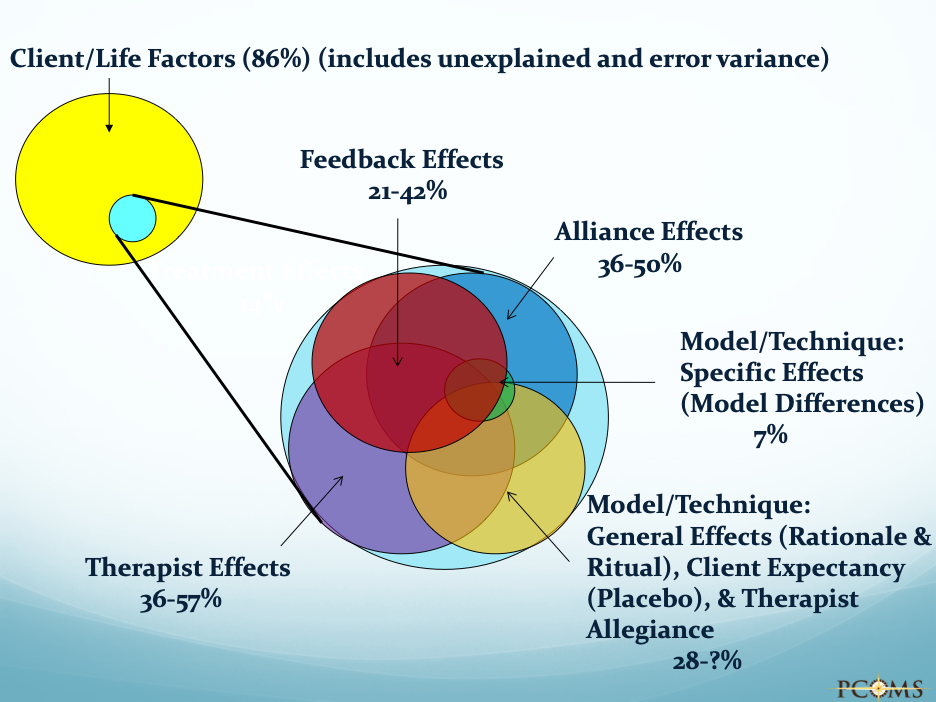Top Ten Qualities of the Best Therapists

An often asked question is what makes one therapist better than another. This blog identifies ten therapist qualities that differentiate the best from the rest.
Fact 1: Therapist effects represent the amount of change attributable not to the model wielded, but rather to whom the therapist is. As depicted in my hallucinogenic figure below, recent meta-analyses suggest that 36-57% of the variance attributed to treatment is accounted for by therapist factors—five to eight times more than that of model differences. In plain English, who is providing the therapy is more important than what model or technique they are providing. Ponder that.
Fact 2: There is great variability in therapist effectiveness. Some therapists are just plain better at securing more positive outcomes across more clients. Some studies show the range of therapist effectiveness is from 20-70%. What makes one therapist better than another?
The Treatment of Depression Collaborative Research Program (TDCRP)
The classic study of depression, the TDCRP, not only further demonstrated the equivalence of outcome among approaches (the dodo verdict) but also illustrates both the above facts. Exploring the variability among psychiatrists in the study, researchers divided the psychiatrists into three categories: most effective, middle effective, and least effective. They found that clients receiving sugar pills from the top third most effective psychiatrists did better than clients taking antidepressants from the bottom third, least effective psychiatrists Who was providing the medication or sugar pill was far more important than what the pill contained. Again, Ponder that.
If we do the same with psychotherapists, we find that clients of the most effective therapists change 50% more and drop out 50% less than clients of the least effective therapists. This continues to beg the question, “Why is one therapist more effective than another?”
No Detectives Needed
We don’t need to do any detective work about what makes one therapist better than another. Research is clear: The alliance has consistently been shown to account for most of therapist differences. In general, research strongly suggests that clients seen by therapists with higher average alliance ratings have better outcomes. Our study confirmed this. We found that therapist average alliance quality accounted for 50% of the variability in outcomes attributed to therapists. Some studies show that therapist alliance quality accounts for a whopping 97% of therapist differences. So, the answer to the oft heard question about why some therapists are better than others is that tried and true but taken for granted old friend, the therapeutic alliance.
Top Ten Characteristics of Successful Therapists
There are many other characteristics that could be mentioned, and this is certainly not the truth with a capital T. This is just my opinion based on what I say above as well as my firm, research supported belief that PCOMS improves outcome. Here is a list of characteristics/behaviors I most like to see in therapists:
- Believe that the client is the source of wisdom, ideas, theories, and solutions. Can showcase client talent and maximize client resources. (Doesn’t mean that they can’t have wisdom, ideas, theories, and solutions too.) Therapists who spend more time in what is called “resource activation” (harvesting client abilities to address goals) as opposed to “problem activation” (discussing the problem and its causes) tend to get better outcomes. As the figure depicts above, 86% of change is accounted for by client/life variables, everything about the client that has nothing to do with us or the therapy. It just makes good sense to believe in client resources. Good therapists believe that clients know what’s best for their own lives and have the motivation and ability to reach their goals…. even in dire circumstances.
- Embrace client privilege and a multicultural orientation. This is what PCOMS is all about. Requesting, documenting, and responding to client feedback has the potential to transform power relations by privileging client beliefs and goals over potentially culturally biased and insensitive practices. PCOMS seeks to level the psychotherapy process by inviting collaborative decision making, honoring client diversity with multiple language availability, and valuing local cultural and contextual knowledge; PCOMS provides a mechanism for routine attention to multiculturalism and social justice.
- Privilege the client’s perspective regarding the benefit of services and systematically monitor it. Provides a structured space at the top of each hour to discuss progress and alter therapy if change is not happening. Understand that benefiting all clients is not possible. This is what PCOMS is all about.
- Skilled at forming alliances with those that others find difficult and structuring the work around client goals and expectations. Are “people persons,” possessing a natural way of connecting, showing appreciation, and expressing understanding…they like people and it shows.
We all have clients who rapidly respond to us. But what about the folks who are mandated by the courts or protective services or who just plain don’t want to be there (like almost all kids)? What about people who have never been in a good relationship or have been abused or traumatized? What about folks that life just never seems to give a break? Well, the therapist’s job, our job, is exactly the same regardless. If we want anything good to happen, it all rests on a strong alliance—we have to engage the client in purposeful work. The research about what differentiates one therapist from another as well as my personal experience suggest that the ability to form alliances with people who are not easy to form alliances with—to engage people who don’t want to be engaged—separates the best from the rest.
- Don’t leave the alliance to chance; provide a structured space in each session to discuss how things are really going with the client and alter accordingly. Understand that some clients are better served by others. This is what PCOMS is all about.
- Skilled at focusing the conversation on what the client would like to see happen and channeling the complexities of topics and client experiences toward something tangible that will make a difference. Believe that therapy is about change and are not satisfied with doing work that doesn’t benefit clients. Do not believe “supportive therapy” is enough or that the continual processing of client lives is a good long-term strategy. It is much easier to meander across a myriad of worthwhile topics and legitimate concerns and not connect the conversation to what the client can do between sessions to improve his or her life. The unfortunate result is a therapy that devolves into an ongoing commentary of the client’s life that never leads to any real change. Sometimes such practices fall under the euphemistic categories of “process oriented” or “supportive therapy.” These therapeutic stances often have negative effects in clients’ lives.
- Are “dyed in the wool” optimists and convey it without cheerleading or being Pollyannaish. While resonating with client despair, they refuse to succumb to it as the only way to understand the client or what they are capable of.
- Embrace uncertainty. While proponents of different models would like you to think otherwise, the truth of the matter is that we don’t know ahead of time what model or technique will be helpful with the client who is in our office now. In other words, there is a lot of uncertainty that accompanies the work of psychotherapy. It is the place of unlimited possibilities for change, the space for new directions and insights to occur to both the client and the therapist. I discussed uncertainty in a previous blog.
- Don’t leave their own development to chance; monitor their outcomes over time and take proactive steps to improve. Embrace their nonresponding clients because they provide opportunities for growth. Are not afraid to do things for the first time or learn from clients who don’t benefit. PCOMS allows you to keep your development on the front burner.
- Accountable first to their clients, and to those who make services possible. Know that services are precious and must be used wisely—that for services to continue there must be proof of value and return on investment for funders. PCOMS provides this proof.
Top Ten Image by Freepi

